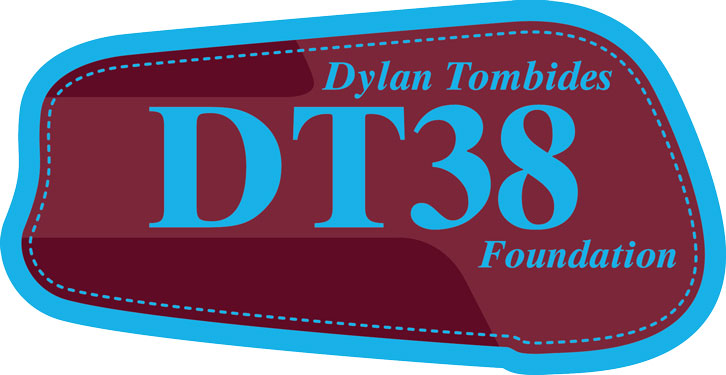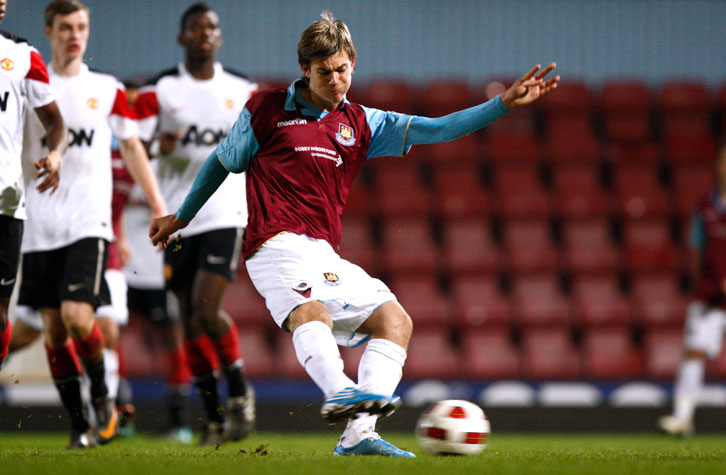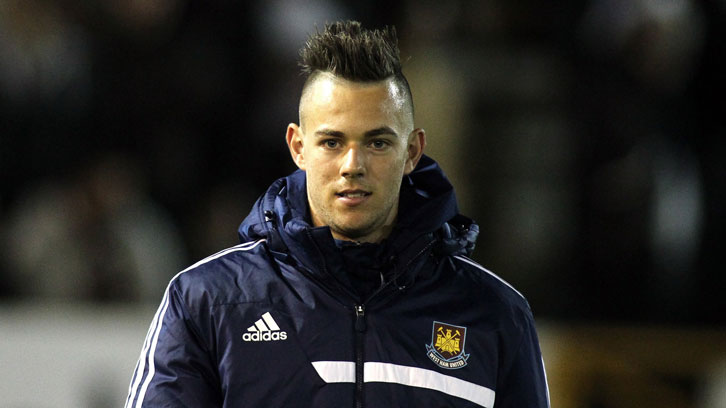
Saturday's Premier League fixture with Leicester City at London Stadium marks the fourth annual DT38 Awareness Day at West Ham United.
DT38 Foundation was launched in 2015 to raise awareness to the risks of testicular cancer, following the passing of Hammers striker Dylan Tombides on 18 April 2014, at the age of just 20.
During his time at West Ham, the Aussie forward made a huge impact and was honoured by the Club in March with the opening of the new Dylan Tombides Learning Centre at the Academy of Football.
Dylan was a very special young man, not simply because he was a talented young footballer who was widely tipped to become a big star, but because of his attitude to life when the boots were off.
His remarkable story is one of courage, laughter, pain and achievement.
He was just 17-years-old when he was diagnosed with testicular cancer, a disease he refused to let define him.
Despite three years of grueling treatment, Dylan trained, he played, he scored, he celebrated, and he laughed, a lot.
Off the football pitch, Dylan was adored because his sense of humour led the way. On the pitch, he was admired because his dedication and talent were breath taking.

It was in April 2011 that Dylan found a lump on his testicle.
He didn’t say anything at first because it was painless and when he did start feeling uneasy, he put iu down to the tough training regime that goes with being an elite athlete.
But the pain continued to grow. Dylan visited his GP who told him that it was just a cyst and that people live with cysts every day, so Dylan finished the Premier League season on the bench against Sunderland and left the country five days later to join his Australia teammates at the FIFA U-17 World Cup.
It was in June 2011, and while representing Australia at that tournament, that a random drugs test raised concerns and shortly afterwards a doctor confirmed the worst.
Three months after his 17th birthday, Dylan was diagnosed with testicular cancer.
Inevitably life was about to change, but much less than anyone around him could ever believe.
Dylan’s spirit would never be broken.
He fought extremely hard to maintain his fitness and strength while going through chemotherapy and amazed everyone around him with his determination and humour.
He once described himself as the ‘happiest kid with cancer’. After all, he was still doing what he loved – playing football – surrounded by family and group of teammates and friends he adored.

But this nasty gatecrasher would not go away. Every time Dylan had treatment, the tumour would return stronger than before.
In January 2012, Dylan had surgery to remove his lymph nodes, but by June the cancer was back, once again.
The song lyric ‘Don’t tell me the sky’s the limit when there are footprints on the moon’ meant the world to Dylan. Despite more than a year of chemotherapy at this point, Dylan refused to let cancer rule.
He trained despite the pain, he scored despite the pain, he continued to impress despite the pain. And on 25 September 2012, Dylan made his senior debut for West Ham United in an EFL Cup tie at the Boleyn Ground.
On that night, under the floodlights, a dream came true.
In March 2013, Dylan was preparing for the FIFA U-20 World Cup but the cancer had resurfaced, this time in his liver. He had surgery to resect his liver and he was told he had to rest for three months.
During this ‘rest’ period Dylan went into West Ham’s training ground every day and continued mild exercise until he was allowed back into more strenuous training.
By this time his battle with cancer had lasted two years. In total he had endured months of torturous treatment, but he was still yearning to play football, still putting in the hard yards, still desperate to score goals.
His will to succeed, coupled with his loving, cheerful nature, are what defined Dylan, not a disease called cancer.
It is this strength and resilience that continues to inspire new generations of young men and women today.

Dylan’s final chapter began in November 2013.
The cancer had returned but despite it all he was determined to go through yet more chemotherapy so he would have a chance of being fit for the Under-22 World Cup tournament in Oman in January 2014.
Once again Dylan succeeded, he played for his country one last time.
With the tournament over Dylan discovered that this particular journey had come to end, the cancer had continued to take hold and with that the chances of finding a successful treatment had disappeared.
But Dylan’s journey now continues elsewhere, in a place where love conquers all and the gatecrasher can never reach him.
On 18 April 2014, Dylan passed away in the company of his loving family, but in DT38 Foundation his legacy lives on.
*Every year around 2,200 men and boys in the UK are diagnosed with testicular cancer. To find out more about DT38 Foundation, their awareness work and how to check for signs of testicular disease visit dt38.co.uk
The DT38 Vision
Our vision is to change the way testicular cancer is diagnosed by implementing best practice diagnostic guidelines for patients who present with testicular symptoms. We also aim to arm future generations of young men with the necessary knowledge about testicular cancer that will enable them to be confident when taking health matters into their own hands.
The DT38 Mission
Our mission is to raise awareness and change the stigma associated with men’s health issues with a focus on testicular cancer. We aim to do this through providing educational programmes and opportunities for the youth of our community, to help shape a generation of children who are self- aware about their health and wellbeing.
Self-examination is simple
Testicular cancer is the most-common cancer in men under 35, but almost all cases can be cured if spotted and treated early. Warning signs include a hard lump about the size of a pea, slight enlargement of a testicle, a dull ache in the groin or lower abdomen, pain, swelling or discomfort in the testicles or scrotum and a sore on the tip of the penis that irritates or will not heal.
Self-examination is simple and takes only a few moments every month. Know what your testicles feel like normally. Gently roll each testicle between your thumb and fingers. Feel for a lump on the front or side of the testicle If you are concerned, see your doctor or visit a sexual health clinic immediately.
Delay is deadly. Get educated.